While physical mobility for life insurance agents may have been a traditional expectation in Nevada, the rise of virtual consultations and advancements in technology have made the need for a vehicle less essential. Agents can effectively sell life insurance remotely through virtual meetings and online communication platforms, allowing them to reach clients across the state without the constraints of physical travel.

The Landscape of Life Insurance in Nevada
Nevada, with its vast geographical expanse and diverse population, offers a unique playing field for life insurance agents. According to the 2023 Insurance Market Report I found during my research, Nevada’s insurance industry remains in a healthy position. This stems from many individuals recognizing the importance of securing financial protection for their loved ones.
As the demand for life insurance continues to grow, agents face the challenge of navigating the vast geographical expanse of the state. Nevada’s unique landscape presents various considerations when it comes to the mobility and connectivity of life insurance agents. Let’s explore whether having a vehicle is necessary for selling life insurance in Nevada and how technology has transformed the way agents operate.
Curious about earnings from a home-based life insurance sales job in Nevada? Uncover the potential and learn to navigate the landscape. How Much Can You Earn From a Life Insurance Sales Job Working From Home? Read our article and discover the opportunities today!
The Physical Mobility of a Life Insurance Agent
Nevada’s landscape is diverse, ranging from bustling cities like Las Vegas and Reno to more rural and remote areas. The geographical considerations greatly impact the operations of life insurance agents in the state. In urban areas, agents may need to navigate heavy traffic and parking challenges, making a vehicle seem like a practical choice. With a densely packed clientele, agents can often schedule multiple meetings in a single day, maximizing their productivity.
However, with the increasing availability of virtual consultations and advancements in digital tools, agents can effectively serve urban clients without the need for extensive travel. On the other hand, in rural parts of Nevada, the distances between clients can be significant. Agents may need to travel long distances to meet with potential policyholders. The expansive terrains of rural Nevada might also lack consistent high-speed internet connectivity, making virtual consultations challenging.
In these cases, having a reliable vehicle may still be advantageous, as it enables agents to reach clients more efficiently. Beyond the mere distance, personal face-to-face meetings in rural areas often cultivate a deeper level of trust and understanding, which can be crucial for life insurance discussions. However, it’s also worth noting that as technology continues to evolve, rural areas might soon see better digital infrastructure, potentially changing the dynamics of client-agent interactions.
Given the distinct challenges and opportunities faced by life insurance agents across Nevada’s varied landscapes, one can’t help but wonder about the dynamics of other sales professions in the state. Curious about how life insurance compares to real estate sales in the heart of Las Vegas? Dive into our comprehensive comparison to find out: Selling Life Insurance Or Estate in Las Vegas, Which Is Easier?

Urban vs. Rural Nevada: The Geographical Considerations
Nevada’s landscape is diverse, ranging from bustling cities like Las Vegas and Reno to more rural and remote areas. The geographical considerations greatly impact the operations of life insurance agents in the state. In urban areas, agents may need to navigate heavy traffic and parking challenges, making a vehicle seem like a practical choice. However, with the increasing availability of virtual consultations and advancements in digital tools, agents can effectively serve urban clients without the need for extensive travel.
On the other hand, in rural parts of Nevada, the distances between clients can be significant. Agents may need to travel long distances to meet with potential policyholders. In these cases, having a reliable vehicle may still be advantageous, as it enables agents to reach clients more efficiently. However, even in rural areas, the option of virtual consultations can be explored, reducing the need for frequent travel and making it easier to connect with clients in remote locations.
Virtual Consultations: A New Age Solution
Virtual consultations have emerged as a prominent tool in the rapidly evolving life insurance sector. The transition from traditional in-person meetings to digital consultations reflects the industry’s response to technological advancements and changing consumer preferences.
The benefits of this digital shift are evident. Virtual consultations provide a direct, efficient communication channel between agents and clients. Agents can now use tools such as screen sharing for immediate policy demonstrations and employ electronic document signatures for swift policy approvals. This not only meets the expectations of a technologically adept clientele but also offers an environment conducive to informed decision-making.
From an operational standpoint, the use of digital platforms reduces costs for life insurance agents. The reduction in travel and the potential elimination of physical office spaces can lead to considerable savings. Furthermore, the capacity to engage multiple clients from different locations within the same day can increase both productivity and sales figures. In light of these advantages, the shift toward virtual consultations underscores a commitment to accessibility, efficiency, and client-centric service in the life insurance industry.

Cost-Benefit Analysis: Vehicle Ownership vs. Other Transportation Modes
Ensuring efficient mobility is paramount for life insurance agents in Nevada. However, the choice between owning a vehicle and opting for alternative transportation modes is not merely a matter of convenience but also a financial one.
Below is a detailed cost-benefit analysis to aid in this decision-making process.
| Evaluation Criteria | Vehicle Ownership | Other Transportation Modes |
|---|---|---|
| Initial Costs | The purchase price of the vehicle | Initial membership fees for car-sharing platforms or starting costs for ridesharing accounts |
| Ongoing Expenses | Fuel, insurance, maintenance, parking fees | Fares for ridesharing services, occasional fees for car-sharing platforms |
| Depreciation & Wear | Vehicle depreciation, wear and tear over time based on miles driven | N/A (no ownership, thus no depreciation concerns) |
| Potential Benefits | Increased sales opportunities, client convenience, freedom of movement | Flexibility, no long-term commitments, availability in desired areas, potential cost savings for agents not requiring frequent travel |
| Other Considerations | Resale value, possible loan interest, and personal use advantages | Reliability of service, wait times, and the possibility of surge pricing during peak hours |
Agents are urged to comprehensively evaluate the listed costs and benefits, understanding that the right choice varies based on individual business needs and personal preferences. A tailored approach, considering both present financial implications and future business growth, will pave the way for optimal success in selling life insurance in Nevada.

Client Preferences in Nevada: Virtual vs. Physical Meetings
Understanding the preferences of Nevadans is crucial in determining whether virtual or physical meetings hold more sway. Diving deeper into the fabric of Nevada’s society reveals the intricate cultural and generational nuances influencing clients’ meeting preferences. The state, characterized by its melting pot of cultures, offers a vibrant tapestry of traditions, values, and behaviors.
Older generations, who grew up in a pre-digital era, often resonate more with the tangible aspects of face-to-face interactions. For them, trust is built through direct eye contact, a firm handshake, and the personal touch that comes with physical meetings. In contrast, younger generations, who have grown up in a digitally connected world, are more accustomed to and comfortable with virtual interactions. Their affinity for technology often means they view virtual consultations as a natural, efficient extension of their daily communications.
Cultural backgrounds also play a role. Some cultures place a premium on in-person interactions, viewing them as a sign of respect and commitment. On the other hand, the state’s influx of tech-savvy professionals and millennials might be more inclined toward virtual interactions due to their sheer convenience and the minimalistic, streamlined process they offer. Agents must recognize and appreciate these generational and cultural differences. By doing so, they can approach their clients with empathy, understanding, and a service model tailored to individual preferences, ensuring a more successful and satisfying consultation experience for both parties.

Making an Informed Decision
In making a well-informed decision about vehicle ownership, aspiring agents in Nevada must carefully weigh the factors discussed throughout this article. Each individual circumstance is unique, and choosing the most suitable approach requires thoughtful consideration.
Agents should consider the following key points:
- Client Preferences: Determine the preferences of the target clientele. Conduct market research, gather feedback, and adapt the approach accordingly.
- Geographic Considerations: Evaluate the geographical landscape and transportation options available in Nevada. Assess the need for extensive travel and the feasibility of relying on public transportation or alternative modes of transport.
- Financial Implications: Conduct a thorough cost-benefit analysis of vehicle ownership, considering all associated expenses. Compare these costs to the potential benefits of in-person meetings and increased sales opportunities.
- Environmental Impact: Factor in the agent’s commitment to sustainability and eco-friendly options. Explore alternative modes of transport, such as biking or electric vehicles, to align with environmental values.
By carefully considering these points, aspiring agents should consider clients’ preferences, finances, and values. Virtual consultations offer convenience in decision-making. For some, face-to-face meetings build trust. Both approaches can ensure success in Nevada’s life insurance industry.
The rise of virtual consultations has changed the need for a vehicle in Nevada’s life insurance sales. Still, in-person meetings offer unique benefits. Agents should weigh client preferences, geography, and costs. Success in Nevada requires adapting to client needs, whether meetings are virtual or face-to-face.
Ready to kickstart your life insurance sales career from home? Dive into the industry with the guidance of someone who’s been there. Join my mentorship program and let’s pave the way to your success together.





